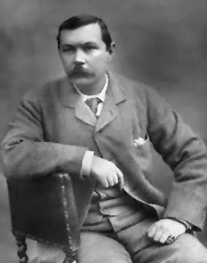
Image source:
National Portrait Gallery
Sir Arthur Conan Doyle was a physician and British author whose many works included the Sherlock Holmes stories.
Quotes by Arthur Conan Doyle in Time One
Eliminate all other factors, and the one which remains must be the truth.
Each fact is suggestive in itself. Together they have a cumulative force.
[O]ne true inference invariably suggests others.
What a blind beetle I have been!
Singularity is almost invariably a clue.